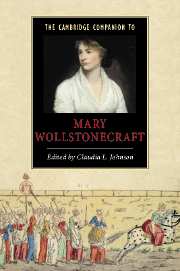Book contents
- Frontmatter
- 1 Introduction
- 2 Mary Wollstonecraft's letters
- 3 Mary Wollstonecraft on education
- 4 Mary Wollstonecraft's Vindications and their political tradition
- 5 Mary Wollstonecraft's French Revolution
- 6 Mary Wollstonecraft's literary reviews
- 7 The religious foundations of Mary Wollstonecraft's feminism
- 8 Mary Wollstonecraft and the literature of advice and instruction
- 9 Mary Wollstonecraft's A Vindication of the Rights of Woman and the women writers of her day
- 10 Mary Wollstonecraft and the poets
- 11 Mary Wollstonecraft's novels
- 12 Letters Written During a Short Residence in Sweden, Norway, and Denmark: traveling with Mary Wollstonecraft
- 13 Mary Wollstonecraft and the sexuality of genius
- 14 Mary Wollstonecraft's reception and legacies
- Select bibliography
- Index
13 - Mary Wollstonecraft and the sexuality of genius
Published online by Cambridge University Press: 28 May 2006
- Frontmatter
- 1 Introduction
- 2 Mary Wollstonecraft's letters
- 3 Mary Wollstonecraft on education
- 4 Mary Wollstonecraft's Vindications and their political tradition
- 5 Mary Wollstonecraft's French Revolution
- 6 Mary Wollstonecraft's literary reviews
- 7 The religious foundations of Mary Wollstonecraft's feminism
- 8 Mary Wollstonecraft and the literature of advice and instruction
- 9 Mary Wollstonecraft's A Vindication of the Rights of Woman and the women writers of her day
- 10 Mary Wollstonecraft and the poets
- 11 Mary Wollstonecraft's novels
- 12 Letters Written During a Short Residence in Sweden, Norway, and Denmark: traveling with Mary Wollstonecraft
- 13 Mary Wollstonecraft and the sexuality of genius
- 14 Mary Wollstonecraft's reception and legacies
- Select bibliography
- Index
Summary
For a reader coming to the life and work of Mary Wollstonecraft for the first time, one of the most compelling aspects of her career is its power to unsettle the homosexual/heterosexual split that the twentieth century made so rigid. This unsettling occurs partly because Wollstonecraft, like all eighteenth-century writers, had no words like “homosexual” or “heterosexual” in her vocabulary. Sexuality had no language of its own in the eighteenth century. Instead, writers understood sexual roles through the vocabulary of gender: certain modes of sexual behavior were the supposed prerogatives of masculinity; others, of femininity.
What is so interesting about the eighteenth century is that neither “masculinity” nor “femininity” was a fixed category. When eighteenth-century writers argued about virtually anything (education, aesthetics, law, natural philosophy, religion, politics), they usually did so in loudly gendered terms. However, gender definitions were not necessarily the same in each discourse; they were as likely to differ as to complement one another. Consequently, eighteenth-century writers like Wollstonecraft could set different definitions against each other, using those from one discourse to criticize those in another.
- Type
- Chapter
- Information
- The Cambridge Companion to Mary Wollstonecraft , pp. 228 - 245Publisher: Cambridge University PressPrint publication year: 2002
- 12
- Cited by



